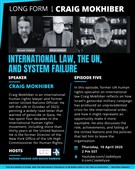[The following statement was issued by the Global Palestinian Right to Return Coalition on 5 February 2013.]
To the children of our heroic Palestinian people,
To those who safeguard the unity of our people, our representation, and our cause,
As the Palestinian people await the meeting of various sectors of Palestinian leadership on the eighth of February in Cairo, and as we anticipate further development of steps towards turning the page on painful Palestinian divisions, the Global Palestinian Right to Return Coalition welcomes these meetings and initiatives and hopes that they will preserve the political and geographic unity of our people. We hope these steps will empower Palestinians with the political and national will to overcome all obstacles and elevate our national work so that it may be deserving of the sacrifices and struggle of our great people.
However, while discussion of reconciliation and unity is important, we believe that the most critical issue is the re-activation and revitalization of the Palestinian Liberation Organization, and the need to hold direct elections to the Palestinian National Council where all eligible Palestinians, inside and outside the homeland, can vote.
We therefore emphasize the following points concerning elections to the Palestinian National Council:
- We assert the necessity of holding elections to the Palestinian National Council, and the participation of all Palestinians in the revitalization of the Palestine Liberation Organization as the sole legitimate representative of the Palestinian people;
- We demand the Palestinian Legislative Council remain a part of the Palestinian National Council, in order to preserve the unity of the Palestinian people;
- We call on the participation of all Palestinian national forces, civic associations, and communities in the ongoing discussion to develop an electoral law commensurate with the conditions and aspirations of our people;
- We must ensure that all Palestinians, wherever they are, have the right to vote, without exception and without the exclusion of any Palestinian communities (i.e. every Palestinian over the age of eighteen will have the right to vote);
- Decisions issued with regard to elections to the PNC have enormous political implications and significant impact on the fundamental rights of Palestinians. Therefore, we must make decisions based upon sound procedures and a clear understanding of the issues at stake, and take into account the advice of experts and voters and communities themselves;
- Selection of appropriate sites for the registration and elections process must take into account the right of all Palestinians to participate safely.
Yes to National Unity
No to the surrender of the Right of Return
Global Right to Return Coalition
Signatories:
PLO Executive Office for Refugees – West Bank
Committee for the Defence of Rights of Palestinian Refugees/Yafa Cultural Center
Union of Youth Activity Centers – West Bank Refugee Camps
Union of Youth Activity Centers – Gaza Refugee Camps
Union of Women’s Activity Centers – West Bank Refugee Camps
Consortium of the Displaced Inhabitants of Destroyed Palestinian Villages and Towns
Higher National Committee for the Defence of the Right of Return – Palestine
National Committee for the Commemoration of the Nakba – Palestine
Association for the Defense of the Rights of the Internally Displaced (ADRID), Nazareth
Palestine Remembered - Jordan
General Union of Jordanian Women
‘A’idun Group – Syria
‘A’idun Group – Lebanon
Beit Atfal Al-Sumoud – Lebanon
Group 194 – Syria
Right of Return Committee – Athens, Greece
Association Najdeh – Lebanon
Right of Return Committee – Sweden
European Federation of Right of Return Committees
Palestinian Return Network – Netherlands
Coordination Bureau – Lebanon
Rua’a Association for Culture and the Arts – Lebanon
Popular Association for Relief and Development - Lebanon
![[Israel`s West Bank Separation Barrier. Image by gnuckx via Flickr]](https://kms.jadaliyya.com/Images/357x383xo/SeparationBarrierWeb.jpg)

















